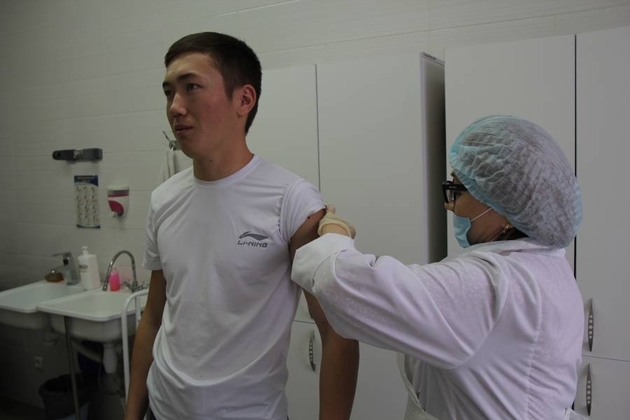Authorities in Kazakhstan have caved under pressure from vaccination skeptics and removed a passage in a proposed bill that would have made it obligatory for parents to ensure that their children receive jabs against measles, mumps, and rubella, Eurasianet writes in the article Kazakhstan: Mandatory vaccination plans dropped. In other changes to the same bill, legal protection for doctors has been bolstered by making it more complicated to initiate criminal probes for suspected medical malpractice.
The bill, which was amended after scrutiny in the upper house, was approved by the lower house of parliament on June 17 and will now be sent to President Kassym-Jomart Tokayev for his approval.
Senator Serik Bekturganov said that the bill in its definitive form “confirms the right of parents to make an independent and informed decision” on whether or not their children should be routinely vaccinated against dangerous diseases. This marks a victory for the vaccination skeptics who had bristled at what they felt was a violation of their liberties in the version of the legislation approved on May 13 by the Majlis, the lower house of parliament.
At a session of the Majlis in March, lawmaker Murat Temirzhanov said, without specifying the provenance of his data, that 65 percent of vaccination refuseniks cited the poor quality of drugs used in Kazakhstan as justification for opting out. Health Minister Yelzhan Birtanov responded at a parliamentary question session that the government had recorded no complications associated with vaccinations.
Marina Shaimakhanova, an activist from the capital, Nur-Sultan, is among those who will be cheering the change to the bill. She lost her young daughter in November and has attributed that death to a measles vaccine that the baby was given a week before. In cases where such incidents occur because of suspected malpractice by a doctor, however, the public will have potentially limited recourse. The procedure for filing a criminal investigation against medical practitioners facing accusations of lack of professionalism will now require more stages of fact-gathering and bureaucratic procedure by an authorized state body.
Bekturganov said this provision was needed because of an existing system that he said enables the propagation of suspicion and distrust toward medical workers, which has the result of paralyzing their work. While accusations of malpractice are common, few of these actually end up in the courts, he said.
In September, a large number of medical workers – including 72,000 doctors and 175,000 nurses – submitted a petition to parliament noting that the number of criminal cases over alleged malpractice was growing every year. The signatories to the letter argued that "a whole class of interested parties has formed: bloggers, media representatives, lawyers who pressure and slander doctors – all for hype, just to achieve their personal and career goals."
One high-profile case last year involved the arrest of the chief doctor of an Almaty hospital, Kanat Tezekbayev, and an anesthesiologist, Askar Tungushbayev, on charges of improper performance of professional duties that are alleged to have ultimately caused the death of a patient. A prosecutor in Almaty had sustained serious injuries in a motor accident and then received treatment from medical workers that included Tezekbayev and Tungushbayev. Worried at the quality of treatment, the prosecutor’s relatives transferred him to a clinic in Germany, but he nonetheless succumbed to his injuries. The investigation into this case is still ongoing.






